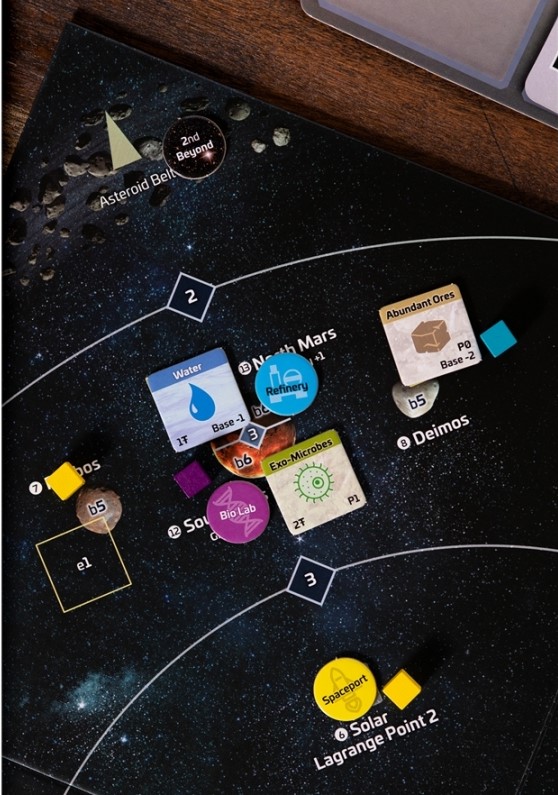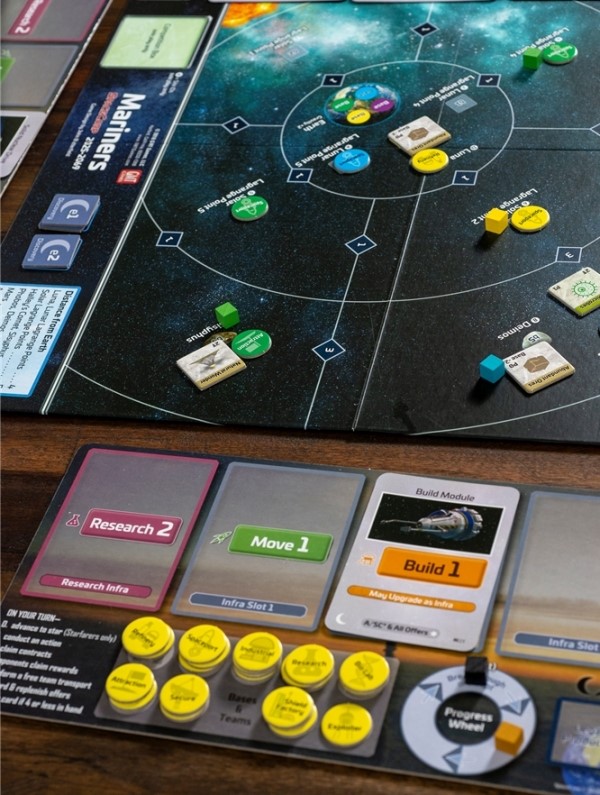After the brain-melting complexity of Gandhi (which is absolutely fantastic, by the way), today I’m looking at another GMT Games game. SpaceCorp 2025-2300AD isn’t a COIN game, but it is a game played on a grand scale, with a large amount of strategy and planning involved.
If you saw the words ‘GMT Games’ in the previous paragraph, and you’re expecting to read a review of a war game, think again. SpaceCorp is a game of exploration, expansion, and exploiting the precious resources found on other planets and asteroids. In fact, I guess you could call it a 3X game, instead of a 4X, as there’s not much in the way of extermination going on. You don’t need me to tell you that 4X has been done to death, but what I can tell you is that SpaceCorp does things differently to the vast majority of exploration games out there.
Economies of scale
Or more accurately, economies and scale. SpaceCorp has both in abundance. As you might have gathered from the game’s name, you’re running corporations, and in the not-too-distant future there’s big bucks to be made in space. Throughout the game you’ll be trying to turn a profit, mainly by running production on your various outposts and buildings as they’re built, but also by beating others to some shared objectives.

Currency is just currency at the end of the day though. What makes SpaceCorp so exciting is the sheer scale of the game as it progresses. The full game is split into three eras, each with its own board, with each successive era introducing new rules and variances into the game. It’s a bit like a game coming with modular expansions, that are gradually added in.
The first era sees your fledgling corporation building its foundations in the relative safety of this side of the asteroid belt. From there, your small steps turn into giant leaps, as you broaden your horizons toward the outer solar system, and the vast distances and radiation dangers that come along with it. The third, and final, era takes you interstellar, heading to nearby star systems to continue your expansion. The exponential layers of distance and scale each era introduces, make it feel like a truly epic undertaking.
It’s not rocket science
The biggest surprise when it comes to playing SpaceCorp 2025-2300AD is how easy it is to play. If your preconception of a GMT game is something akin to a physical spreadsheet on the table, you’ll be surprised with how simple, and refined, things are in space. Movement, exploration, building, and research are all driven by cards. Instead of cards filled with detailed artwork and fluff text, there are huge, colour-coded boxes, with bold text explaining the value of each. It’s a brilliant design choice, as it removes a layer of comprehension, leaving you free to concentrate on what you want to do, instead of trying to understand if you can do it. I wish more games did it this way.

The basic gameplay loop is very quick and easy. Choose an action, see if anything else gets triggered by your action, discard any played cards and refresh your hand and the display. Despite turns ticking over at warp speed, it’s a long game. In order to move around, craft your deck and player board, and build everything you’ll need to boldly go, you end up needing a lot of actions.
Every other player is trying to (largely) do the same as you, so strategy really comes to the fore. If your plans hang by a thread, due to you needing to build on a certain moon or asteroid, and someone gets there first, it’s like someone poking holes in your spacesuit. It’s a great example of indirect player interaction, perfect for the sort of person who doesn’t like the warfare of something like Twilight Imperium.
Solo play
SpaceCorp comes with a very slick solo opponent. Its turns are dictated by flipping cards, and instead of adding in a separate solo deck, as many games do, SpaceCorp does something clever. On the bottom of each of the cards of the three decks in the game (one per era) are the instructions for the bot of another era. Flip a card, consult the reference card, and do what it tells you to. It’s absolutely effortless to run, which is my biggest prerequisite in a good automa opponent.

The bot does a good job of letting you practice the game, and it’s neither too easy nor too difficult to beat, which is great. My biggest disappointment with the bot is that it doesn’t really mirror how a human would play. As an example, if you want to build somewhere, you need to move one of your cubes there. If you’re playing against a person, when they move a cube somewhere, you’ve got a reasonable idea of the sort of thing they might be up to. The bot, however, is random, so it’s next turn might be something else on the opposite side of the board.
It’s not a dealbreaker for me. I still get to play a great game on my own, and learn how to build the engines of industry that’ll propel me to intergalactic glory. Just don’t expect an opponent that feels clever.
Final thoughts
SpaceCorp 2025-2300AD is a very good space exploration game. It captures that same feeling of near-future sci-fi that Terraforming Mars does, for example, but it feels much more thematic. A large part of that is due to the way nothing dives into too much detail. There’s no over-the-top explanation of how the refineries look, or what they do – they’re just a cardboard disc you drop on the board. That’s just one example, but this abstraction allows you to focus on the bigger picture: your corporate machinations in space.
I was so surprised at the relative lightness of the game, especially with it coming from GMT. It’s not light light, it’s a solid middleweight game, but it’s a game you can teach to someone and have them compete at in the same night. I love the fact you can just stop after one or two eras if you don’t have enough time to play all three, and still have the experience of having played a full game, not just a part of one. On the flip-side of this, the way certain things carry over from one era to the next means that it doesn’t feel like three disjointed games, one after the other.

Clear iconography, great reference cards, three different boards, a ton of cards and so many different ways to approach the game. There’s a lot to like about SpaceCorp. The solo bot is a great addition, with the caveat I mentioned above, and I love the way the options available expand in-line with your own exploration. I remember feeling genuine tension at the first time I had to cross the radiation zones on the Planeteer board. For a game that looks as plain as this does at times, it draws you in like you wouldn’t believe.
If you want a sci-fi theme and a ruleset that won’t make your brain dribble out of your ears, SpaceCorp 2025-2300AD is the way to go.
Review copy kindly provided by GMT Games. Thoughts and opinions are my own. All photographs ©Scott Mansfield.
 Games
Games How to resolve AdBlock issue?
How to resolve AdBlock issue? 




















